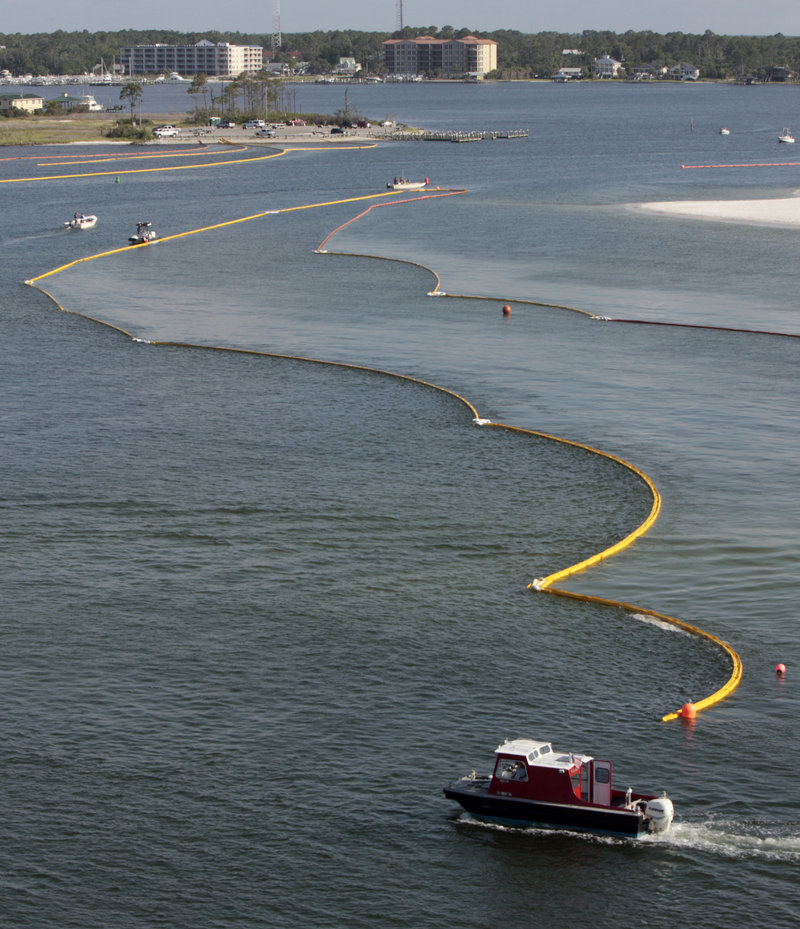WASHINGTON – America’s vaunted can-do spirit is badly frayed.
From the Gulf oil spill to the war in Afghanistan, from lost jobs to soaring budget deficits, cascading crises are defying easy resolution and undermining faith in the future.
• Take the oil gushing from a broken well into the Gulf of Mexico for more than six weeks, despite all efforts to stop it.
That gusher, which can be seen around the clock on live video feeds from the ocean floor, stands as a vivid image of the limits of modern technology and governance. We can fly through space and walk on the moon — but can’t stop a crude oil leak that has grown into the nation’s worst environmental catastrophe.
• Then there’s the economy. Many months after the recession was said to be over, Friday’s jobless figures showed the nation still in the grip of frighteningly high unemployment — despite Obama administration insistence that no problem is getting more attention.
• Abroad, the United States still hasn’t defeated the Taliban in Afghanistan after nearly 10 years of trying. We seem unable to slow the nuclear march of Iran and North Korea. And efforts to broker peace in the Middle East keep slipping from our grasp.
These aren’t just problems for President Obama. But as the nation’s leader, he is taking the most heat.
“He’s certainly moved from seeming to walk on water to really slogging in the mud, the oil-filled mud if you will,” said Fred Greenstein, a Princeton University presidential scholar. “He is hitting a lot of existential obstacles — things that are out there and that are intractable.”
For now, the disaster at the top of the list is the oil still spewing from the blown BP well. It’s hitting more shores and coating more birds, as shown in sickeningly vivid photos.
Obama visited the Gulf Coast on Friday for the third time since the April 20 blowout and fire on the Deepwater Horizon rig that killed 11 workers. The company said it was diverting some oil up a pipe from a cap it placed on the well but it was not yet clear how much. Obama cited signs of apparent progress but said it’s “way too early to be optimistic” about BP’s latest attempt.
A recent Gallup poll found that more than half of those surveyed thought Obama was handling the crisis poorly. With the spill threatening to undermine his presidency, Obama abruptly scrapped a trip to Indonesia and Australia for the second time this year to focus on the crisis at home.
It’s hardly just about Obama. Many Americans, and people in other developed countries, too, have become accustomed to believing that technology and smart thinking can bring manmade calamities under control and help guide a nation’s destiny. Yet, both domestically and internationally, little the United States has tried lately seems to be working.
Pocketbook problems seem unceasing, in the face of enormous efforts to get the economy moving. Friday’s Labor Department report said payrolls rose by 431,000 jobs in May. But all but about 40,000 of them were temporary census positions, and some 125,000 new jobs are needed each month just to keep pace with new entrants into the labor force. Thirteen million new ones will be needed to bring the jobless rate down to pre-recession rates of around 6 percent, and economists don’t see that for years — perhaps late 2013, at the earliest.
“We dug ourselves a very deep hole,” said Mark Zandi, chief economists of Moody’s Economy.com.
The overseas picture isn’t any brighter. Last week’s botched Israeli naval commando raid on Turkish-flagged aid ships bound for the Gaza Strip appeared to dampen expectations of any breakthrough in stalled Israeli-Palestinian peace talks. The international condemnation of Israel that followed the raid also further complicates U.S. efforts against Iran’s nuclear program.
Likewise, the conclusion by investigators blaming the sinking of a South Korean warship on a torpedo from a North Korean submarine make it even less likely that the North will agree to return to six-nation talks to limit its nuclear program.
“Things are bad, getting worse,” said Doug Schoen, a Democratic strategist who was a pollster for former President Clinton.
Send questions/comments to the editors.



Success. Please wait for the page to reload. If the page does not reload within 5 seconds, please refresh the page.
Enter your email and password to access comments.
Hi, to comment on stories you must . This profile is in addition to your subscription and website login.
Already have a commenting profile? .
Invalid username/password.
Please check your email to confirm and complete your registration.
Only subscribers are eligible to post comments. Please subscribe or login first for digital access. Here’s why.
Use the form below to reset your password. When you've submitted your account email, we will send an email with a reset code.